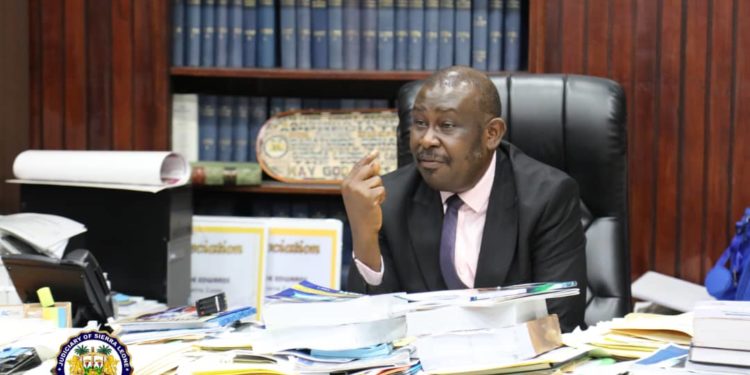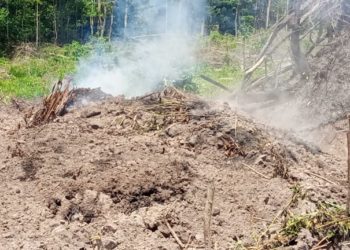Claims by the opposition All People’s Congress (APC) against the judiciary are part of an effort to politicize and control its operations, the Judiciary has said, accusing the main opposition party of seeking to undermine its independence.
Following its rejection of the outcome of the June 24th general elections, one of the reasons the APC cited for not seeking legal redress was that the justice system isn’t independent enough to guarantee it a fair hearing. And among several controversial demands it made as condition to partake in the governance process of the country is for Chief Justice Desmond Babatunde Edwards, among other key figures in government, to resign.
The elections have become the subject of international discourse, after western observers questioned the level of transparency exhibited by the Electoral Commission of Sierra Leone (ECSL) during the process of counting the results, while local and regional observers gave the whole process a clean bill of health.
Yet calls from all these observers for the aggrieved parties to seek redress through legal means have fallen on deaf ears within the APC.
The opposition party listed examples of cases it said illustrates its points, including cases it alleged the judiciary either refused to assign judges to or deliberately delayed handling.
In its statement issued on July 4th, the judiciary described as “unsubstantiated and discourteous” all the claims of the opposition party.
“This cynical attempt by the APC leadership to remotely dictate to the Judiciary and to politicize its operations is stoutly resisted and should be roundly condemned by right thinking people, as it is a feeble attempt to undermine democracy and the Rule of Law,” it said.
Many of the cases the APC cited as part of its complaints related to the 2018 general elections, which it presided over as incumbent and lost to the SLPP.
According to the judiciary, all of the cases filed in relation to those elections were heard or abandoned by the plaintiff. It provided data showing that a total of 31 cases emanated from the 2018 elections, filed by the three main political parties that participated in them – APC, SLPP and NGC – noting that they were all adjudicated and determined by the High Court. It also listed the judges assigned to each of the cases as well as the parties that won each case.
The APC claimed that it filed 33 petitions after 2018, but the judiciary dismissed that as untrue, saying that some didn’t qualify as election petition cases because the filing processes were never completed for them to be assigned to a judge.
The judiciary also argued that all those cases came up at the time of the erstwhile Chief Justice, Abdulai Hamid Charm, who was appointed by former APC President, Ernest Bai Koroma. It said claims that the current Chief Justice delayed to assign a petition by Samura Kamara and Sylvia Blyden in relation to the 2018 presidential election were untrue.
“When the current Chief Justice was appointed in December, 2018 by President Julius Maada Bio, the APC didn’t make any attempt to prosecute the presidential petitions in accordance with the Rules of Court until it became apparent that they were using their case as a ‘talkshop,’ claiming that it has not been heard as a way of blaming the Judiciary and the Hon. Chief Justice,” it said.
According to the judiciary, it was in fact Justice Edwards who re-opened the case in December, 2020, leading to its conclusion in April 2021.
It said that all cases the APC referred to as “high profile political cases” which were allegedly not assigned, were in fact abandoned by the party. And it dismissed claims by the APC that the Chief Justice only assigns cases involving it to “special judges” under his influence, describing them as “fictitious” and “affront on the integrity of the justice system.”
The judiciary statement cited two prominent cases pending at the courts in relation to the 2023 elections, which the APC claimed were still not assigned, including the case requiring the ECSL to produce a disaggregated voter register as well as a case brought by another opposition party, PMDC, challenging the qualification of Chief Electoral Commissioner, Mohamed Konneh.
Mr Konneh is one of the officials the APC is demanding to see their back, including the Inspector General of Police and the head of the Office of National Security.
The authorities at the judiciary believe that APC’s move to use it as a condition not to participate in the governance process was based on a trend of dishonesty demonstrated by its refusal to acknowledge cases it presided over in the last five years, which went in the party’s way. They said the opposition party took this course of action only after failing in its attempt to influence the judiciary.
“The APC has nursed such venom because all attempts to influence and remotely dictate to the Judiciary to assign cases to their recommended or preferred Judges has been met with stiff resistance,” the statement claims.
The APC is itself divided over its decision not to challenge the outcome of the 2023 general elections in court. Some of its members, top among them a former a Minister of Justice, have argued that the courts are the only appropriate route.




















